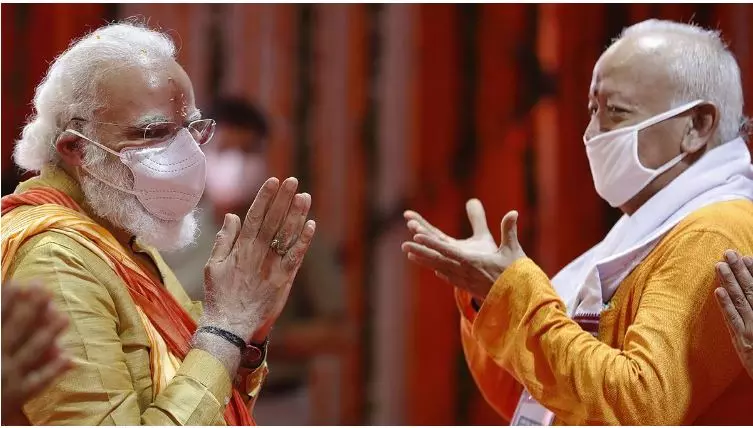
Budget's identification of 'new castes' aligned more with RSS Hindutva agenda
text_fieldsThe Union Budget presented by Finance Minister Nirmala Sitharaman, the first of the newly formed NDA government led by the BJP, has been criticised for its shortcomings on many fronts. However, little attention has been given to its impact on India’s caste system and the reservations based on it.
Unlike India’s traditional system, where funds were distributed among underprivileged communities based on their caste, the newly presented Union Budget sets aside the traditional caste system and instead introduces poverty as the criterion for new castes. Women, the poor, youth, and farmers have been identified by the Finance Minister as the “four new castes,” a classification which has been criticised as being more aligned with the Hindutva ideology of the Rashtriya Swayamsevak Sangh (RSS).
The RSS, the ideological parent of the present ruling party, the BJP, is an advocate of a homogeneous society based on the Hindutva ideology and has often publicly demanded the abolition of reservations based on the caste system, which the BJP opposes as based on religion. However, the caste system, a varna-based hierarchical structure that is inalienable and deeply rooted in society, often dictates social order where underprivileged communities like Dalits and other minority groups are looked down upon. If the reservations, which are their right, were to be removed, the lives of those already in the worst social positions could become even more miserable.
However, the BJP’s latest budgetary approach represents a significant departure from this traditional understanding, shifting towards an economic framework that the government argues will better address poverty and social inequality.
The concept of "new castes" was originally proposed by Prime Minister Narendra Modi in 2019, shortly after the BJP’s re-election. Modi's assertion that India would now recognize only two castes—those affected by poverty and those working to alleviate it—has evolved into a central theme of the current budget.
The BJP’s incorporation of this idea into official policy, especially through economic categorizations, raises concerns about the potential erosion of caste-based reservations and the implications for marginalized communities.
Political analysts view this shift as a tactical move by the BJP to undermine the opposition’s focus on caste-based issues. The opposition, particularly the INDIA bloc, has highlighted the need for a caste census and drawn attention to rising atrocities against Dalits and tribals. By framing caste in terms of economic classes, the BJP seems to be aiming to blunt the impact of opposition parties’ social justice agendas, while simultaneously reinforcing a narrative of Hindu unity.
The BJP's strategy appears to be employing what some experts term “stealth tactics". This involves manipulating existing rules or creating ambiguous laws to advance specific objectives without attracting significant public scrutiny.
According to legal scholar Richard Albert, such tactics include subverting formal amendment processes and establishing conventions that modify legal documents covertly. This approach seems to be evident in the BJP's manoeuvring around the caste issue.
The BJP's dual objective with this new approach is clear. On one hand, it seeks to advance the RSS’s vision of Hindutva, which promotes a Brahmanical hegemony. On the other hand, it aims to counter opposition efforts that have successfully mobilized voters around the issue of caste. By focusing on economic categories rather than caste identities, the BJP is attempting to reshape the discourse and divert attention from issues of social justice and structural inequality.
This shift has profound implications for India’s social and political landscape. The Indian Constitution envisions a society where justice is guaranteed in social, economic, and political realms. However, over 75 years since independence, this vision remains unfulfilled for many, with caste-based discrimination and violence persisting despite reservation for the backward sections.
The introduction of "four new castes", which should have remained more the in the realm of rhetoric than of official policy, in the budget is seen by critics as undermining the constitutional goal of justice, as it replaces caste with broader economic categories that may not address the specific challenges faced by marginalized communities.
Statistics from the National Crime Records Bureau (NCRB) underscore the ongoing severity of caste-based violence. In 2022, there were 57,582 reported crimes against Scheduled Castes (SCs), marking a significant increase from the previous year.
Similarly, crimes against Scheduled Tribes (STs) also rose, with notable increases in cases of rape and assault. This data highlights that caste remains a critical factor in violence and discrimination faced by these communities, further emphasizing the need for caste-specific interventions.
The BJP's emphasis on poverty and economic classes as proxies for caste risks legitimizing attacks on marginalized groups and detracting from the specific needs of these communities. The previous success of caste-based political parties in the 1990s, which led to greater representation of OBC castes in various sectors, highlights the importance of addressing caste explicitly rather than subsuming it under economic categories.
Moreover, the BJP’s recent promise of Dalit sub-categorization—a move aimed at ensuring equitable representation among various Dalit sub-groups—seems at odds with the budget’s new framework. The introduction of "new castes" could undermine this promise and raise questions about the government’s commitment to addressing specific caste-based inequalities.
Political parties that have historically supported caste-based policies, such as the Janata Dal (United) and the Telugu Desam Party (TDP), face a crucial test. Their response to the BJP’s budget and its redefinition of caste will indicate whether they continue to prioritize social democracy or align with the BJP’s new narrative.
(This article is based on an opinion article written by Pottepaka Sandeep Kumar (@Sandeepottepaka), a Hyderabad-based independent researcher.)























